
Edward Curtis Red Hawk 1905

Kim needs money.
• Moon and Kim’s Unprompted DMZ Dance (AFP)
It was a historic handshake that Koreans had waited more than a decade to see — and it sparked a completely unscripted dance with the two leaders hopping back and forth over the border that divides their nations. Everything about the inter-Korean summit had been minutely choreographed and rehearsed but the North’s Kim Jong Un went off-script when he invited his southern counterpart Moon Jae-in to join him over the border. After a prolonged clasp lasting almost half a minute over the Military Demarcation Line that acts as the border, a beaming Moon invited his guest over to South Korea. They posed for pictures as Kim became the first Northern leader to set foot in the country since Korean War hostilities ceased in 1953.
Kim then beckoned Moon over to the other side. Moon seemed initially hesitant but the North’s jovial young leader was not taking “no” for an answer, grabbing his hand and accompanying him across the border before they warmly shook hands again. Grinning broadly, the pair then crossed back to the South hand-in-hand, to be presented with flowers by children from a village in the buffer area next to the Demilitarized Zone. It all went to show that even for a moment as carefully planned as the first inter-Korean summit in more than a decade, where the North’s nuclear arsenal will be high on the agenda, the best-laid preparations rarely run completely to schedule. South Korean officials had carried out a full dress rehearsal on the eve of the summit, including stand-ins for the two leaders. “We examined every single detail including lighting and flower decorations,” a Moon spokesman said.
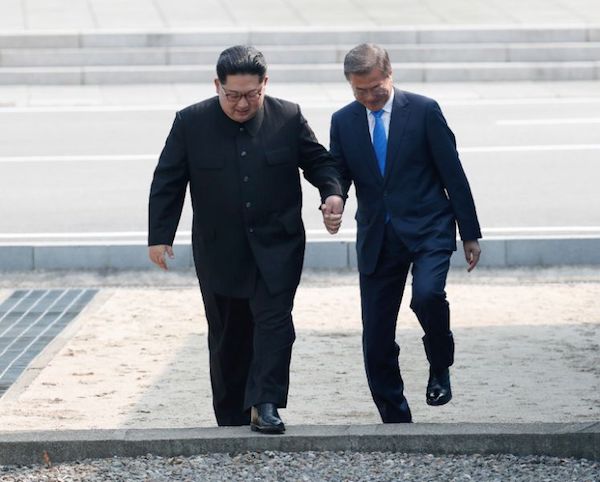
You put your left foot in: Kim Jong Un and Moon Jae-in were engaged in a metaphorical and literal diplomatic dance on Friday when they met at the frontier (AFP Photo/Korea Summit Press Pool)

Sanctions bite too. And “United States with its back against the wall” is perhaps not the right picture.
• Sophisticated North Korean Diplomacy Rewards Kim Jong-un (Pieraccini)
[..] what appears to be emerging is very similar to a strategy cleverly developed by the North Korean leadership over a number of years. As Pyongyang needed to bring the United States to the negotiating table, while at the same time guaranteeing its survival, it pursued its nuclear-weapons program. Since Washington seems to have understood that a military solution is not practicable, especially given the pressure brought to bear by its allies all too cognizant of a nuclear-armed DPRK, Pyongyang is now willing to display its good will, deciding to surprise the world by embarking on negotiations, with the renunciation of its nuclear weapons as a major bargaining chip.
Under these conditions, Pyongyang is willing to cooperate, and South Korea welcomes the initiative with open arms, accelerating the meeting between the two leaders and paving the way for peace on the peninsula. The People’s Republic of China applauds the diplomatic efforts and encourages South Korea, and later America, in these diplomatic efforts. Seoul, Beijing and Pyongyang have every interest in reaching an all-encompassing deal, with or without Washington. The diplomatic ability of this trio has managed to leave the United States with its back against the wall, first of all obliging it to sit down at the negotiating table (something already revolutionary for reasons explained above), and then requiring it to ease sanctions considerably.
Otherwise, North Korea would be seen as the party that is willing to achieve peace, while Washington is left isolated and looking like the warmonger. North Korea finds itself in a win-win situation. If sanctions are eased and peace talks are managed in the right manner, then the process of socio-economic rebirth, which Kim Jong-un considers a priority, can begin. Should the rhetoric of war prevail in Washington, then Washington would find itself at odds with its main ally, Seoul. It is likely that China could even justifiably renounce its sanctions against the DPRK, blaming the US for not making any progress in the face of extraordinary offers by Kim Jong-un to renounce his nuclear weapons.


Win win.
• China Open To Trade Negotiations With United States – Li (R.)
China is open to negotiating with the United States to resolve trade tensions, Premier Li Keqiang was quoted as saying by state media late on Thursday, noting that the countries should manage their conflicts through dialogue. Li made the remarks at a meeting with U.S. Secretary of Transportation Elaine Chao, state broadcaster China Central Television (CCTV) said. U.S. Treasury Secretary Steven Mnuchin is due to lead a delegation to China for talks intended to ease trade tensions. President Donald Trump has threatened a new round of tariffs on $100 billion worth of Chinese products that could target mobile phones, computers and other consumer goods. China retaliated against an initial round of U.S. tariffs on $50 billion in Chinese exports.
“There is no winner in trade conflict, which will not only affect the recovery of the world economy but also the global industrial chain,” Li said in comments reported by the official Xinhua news agency. “It is also what the international community expects from our two countries,” he said. Larry Kudlow, Trump’s top economic adviser, who will join Mnuchin’s delegation in Beijing, said on Thursday he hoped the talks with China would yield progress but that resolving U.S. complaints would be “a long process.” Xinhua cited Li as saying he hoped the two countries would be able to “manage and control” their differences. Li added China would “unswervingly open further to the outside world”, reiterating President Xi Jinping’s assurances over about the country opening more widely to trade.

Abenomics was all about inflation targeting. Silently forgotten.
• BOJ Maintains Stimulus While Removing Language on Timing of 2% (BBG)
The Bank of Japan left its stimulus program unchanged on Friday, while removing language from its statement declaring that it would reach 2% inflation around fiscal 2019. The decision to maintain the yield-curve control program and asset purchases was forecast by all analysts surveyed by Bloomberg. As he enters his sixth year at the helm, Governor Haruhiko Kuroda has the BOJ pushing forward with stimulus even as other major central banks move further toward policy normalization, if at a more moderate pace. Though it removed the language on reaching its 2% target, indicating that more time may be needed, the BOJ left its inflation forecasts largely unchanged. It still forecasts core inflation, which excludes fresh food prices, to reach 1.8% in fiscal 2019.
Still, seven of nine board members said risks to that forecast were weighted to the downside. “The momentum for achieving the inflation target as early as possible is fading,” said Masamichi Adachi, senior economist at JPMorgan Chase. “I take the change as a positive because you can say that their communication is becoming realistic.” Kuroda is expected to reiterate his intention to carry on with the stimulus during his news conference later on Friday. Doing so would likely provide a tailwind for the yen to continue falling, as rising U.S. bond yields widens the gap between returns in the U.S. and Japan.

Pick your favorite.
• What’s The Most Important Chart For Investors? (MW)
Wolf Richter, the man behind the Wolf Street blog, had no trouble zeroing in on the theme for his pick for “chart of the century”: U.S. debt. He did have trouble choosing whether the chart should show ballooning student loans, or ballooning government debt. Either way, ballooning’s the key, as he predicts both narratives will continue to raise alarms. When push came to shove, he opted for the government debt chart.
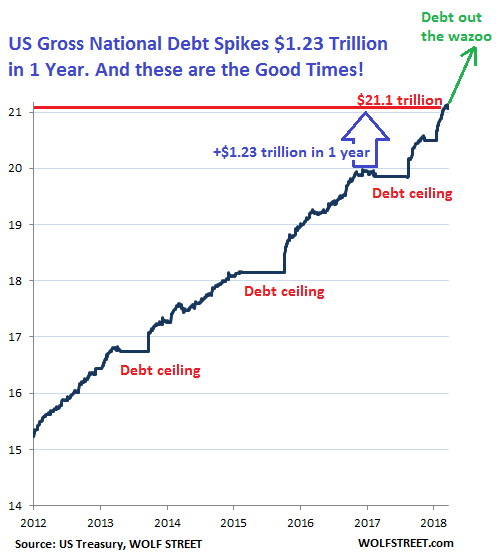
[..] Spending and debt are also the theme of the chart selected by Lance Roberts, chief strategist for Clarity Financial. But his chart focuses on the consumer side of that picture. Visualized here is the widening gap between cost of living, and the income and credit Americans have at their disposal. Up until the late 1980s, disposable income, savings and debt funded the standard cost of living. Since then, however, this chart shows that hasn’t been the case — and the national personal savings rate has dropped from above 10% in the 1970s to below 4% today.
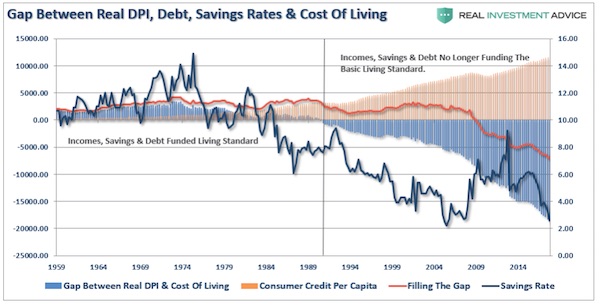
[..] While we’re on the topic of the dollar and rising rates, Tadas Viskanta of the Abnormal Returns blog says this chart tells “the most important story of the century”. “Central banks engineered 0% or in some cases negative yields on cash for the better part of the decade,” Tadas said. “We’re only now coming out of it. Investors may once again begin to think of cash as a viable investment option.”


From Australia, but applicable anywhere. You’re not poor yet? Give us a minute.
• A New Type Of Poverty Is Hurting The Middle Class (SMH)
The banking and finance royal commission has cast light on a new type of poverty to emerge in our society: middle class poverty. To understand it, we have to go back to an earlier government inquiry: the 1972 Commission of Inquiry into Poverty, conducted by Professor Ronald Henderson [which] gave prominence to the Henderson Poverty Index: a measure of consumption described by Henderson as so austere that it was unchallengeable. Updated versions of this index remain a standard benchmark of poverty. But more than 45 years on, the royal commission into finance is revealing that poverty is no longer just about low income.
The commission has heard that Australian banks have adopted actual lending practices (as distinct from their official lending policies) that claim so much household income for contract payments that borrowers are left without enough money to fund basic consumption levels: they are living in poverty. This isn’t an accident: it is a strategic policy by banks. How much do banks think households need for daily living? According to the Australian Prudential Regulation Authority’s submission to the royal commission, banks “typically use the Household Expenditure Measure [a relative poverty measure] or the Henderson Poverty Index in loan calculators to estimate a borrower’s living expenses”. So measures designed to capture the impacts of low incomes are now targeting financially-enmeshed middle-income households, and not as a statement of social shame, but as strategic objects of bank policy.
This has caused embarrassment to APRA, the regulator charged with overseeing those bank practices. In response, it was permitted to make a supplementary submission to the royal commission in March. A consequence of APRA neglect is that “poverty” now goes significantly up the income scale, well into what we generally call the middle class. Middle income people are the cohort in greatest financial risk. They are highly leveraged: they spend more of their income on loan repayments than do people with higher incomes. Second, their assets are undiversified: they own labour market skills, some home equity and some superannuation. Third, these assets are illiquid (not easily sold): you can’t transfer your skills to another, houses are costly to sell and superannuation is generally inaccessible..

The cloud is not a safe environment.
• Amazon Cloud Revenue Jumps 49% In First Quarter (CNBC)
Amazon’s cloud business exceeded analyst estimates, with revenue climbing 49% in the first quarter. Amazon Web Services reported sales on Thursday of $5.44 billion, compared to the $5.26 billion average estimate of analysts surveyed by FactSet. AWS contributed about 11% of Amazon’s total revenue for the period, up from 8.5% in the prior quarter. AWS continues to be a big revenue driver and even larger profit engine for its parent company, which dominates the low-margin e-commerce market.
In cloud-computing infrastructure, Amazon has a substantial market share lead over Microsoft Azure, Google’s Cloud platform and IBM, as well as other players like Alibaba and Oracle. While AWS has maintained growth above 40%, Microsoft and Google are currently expanding much faster and picking up share. In the first quarter Microsoft’s Azure cloud grew 93%. AWS produced $1.4 billion in operating income in the first quarter. That accounted for 73% of Amazon’s $1.93 billion in operating income.
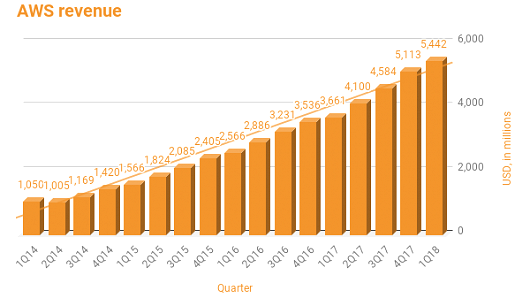

How much of that comes from selling data?
• Facebook Profits Soar 63% Despite Cambridge Analytica (Ind.)
Facebook profits soared 63% to $5bn (£3.6bn) in the first three months of the year despite the company being engulfed in a data privacy scandal that has angered millions of users. Allegations that up to 87 million Facebook users’ data was collected without their knowledge and then used by Cambridge Analytica to try to sway the US Presidential election and the Brexit vote, did little to slow the tech company’s rapid growth. Total revenues jumped 49% compared to the same three months last year, Facebook reported on Wednesday. Facebook has been scrambling to mollify angry politicians and reassure users that it will safeguard their personal information.
Amid the turmoil, observers were keenly watching the company’s user figures to assess the potential damage and see if the scandal would suppress Facebook’s growth. Despite high-profile social media campaigns calling users to boycott Facebook, user numbers kept in line with expectations. Those results again demonstrated the company’s ability to thrive amid controversy. It continued to grow over the last year despite a steady drumbeat of revelations that Russian-linked actors used the platform to try and fracture the electorate and promote Mr Trump ahead of the 2016 presidential election.

But the CIty still has lots of political power.
• EU Doesn’t Need The City Of London, Says Chief Brexit Negotiator (G.)
The EU does not need the City of London, and Theresa May’s “pleading” for a special deal for the UK’s financial services sector will not be rewarded, the EU’s chief negotiator, Michel Barnier, has said. In his toughest rebuff yet to the demands made by the British prime ministerin her landmark Mansion House speech, Barnier suggested the City would be granted nothing more generous than that enjoyed by Wall Street. “Some argue that the EU desperately needs the City of London, and that access to financing for EU27 business would be hampered – and economic growth undermined – without giving UK operators the same market access as today,” Barnier said at a meeting of finance ministers in Sofia, Bulgaria. “This is not what we hear from market participants, and it is not the analysis that we have made ourselves.”
May had argued in March, in a keynote speech spelling out her vision of a future UK-EU trading relationship, that failing to construct a special deal for the City would hurt economies on both sides. The City provided more than £1.1tn of cross-border lending to the rest of the EU in 2015 alone. May conceded in her speech that the current “passporting” regime, under which UK-based financial services would automatically have the right to operate across the EU, would not survive Brexit. However, she went on to suggest that a mutually agreed system would be necessary that would give the UK’s financial services sector greater assurances over future rules than the current “equivalence regime”.

Our ‘leaders’ look the other way, they have other priorities.
• Turkey Crackdown Suffocates Society, Creates Climate Of Fear (Amnesty)
The report reveals how few areas of Turkey’s once vibrant independent civil society have been left untouched by the ongoing state of emergency. A nationwide crackdown has resulted in mass arrests and dismissals, thehollowing out of the legal system and the silencing of human rights defenders through threats, harassment and imprisonment. “Whilst the jailing of journalists and activists may have hit the headlines, the profound impact that Turkey’s crackdown has had on wider society is harder to quantify but it is no less real,” said Amnesty International’s Europe Director, Gauri van Gulik. “Under the cloak of the state of emergency, Turkish authorities have deliberately and methodically set about dismantling civil society, locking up human rights defenders, shutting down organisations and creating a suffocating climate of fear.”
The state of emergency, declared in July 2016 as a temporary exceptional measure in the wake of the failed coup attempt, was renewed for a seventh time last week. Under its imposition, the rights to freedom of expression to liberty and security and to fair trials have been decimated. In so doing, the last line of defence for any healthy society – namely the work of human rights defenders – has been breached. Blanket bans on public gatherings in cities across Turkey have curtailed the right to assembly and association. Meanwhile more than 100,000 people have faced criminal investigations and at least 50,000 people have been imprisoned pending trial. More than 107,000 public sector employees have been summarily dismissed.
Many of the country’s most prominent journalists and human rights defenders, including Taner Kılıç, honorary chair of Amnesty International Turkey, have been jailed on baseless “terrorism” charges. But their arrests are merely the tip of the iceberg. Anti-terrorism laws and trumped-up coup related charges are used to target and silence peaceful, legitimate dissent. Prominent journalists, academics, human rights defenders and other civil society actors are subjected to arbitrary detention, prosecutions and, if found guilty in unfair trials, face long sentences.

Greek recovery narrative is an insult.
• Greece’s Economic Crisis Is Over Only If You Don’t Live There (WaPo)
Greece’s economic crisis is over only if you don’t live there. Everyone else, in other words, might have moved on because Greece isn’t threatening to knock over the other dominoes that are known as the global economy anymore, but its people are still stuck in what is the worst collapse a rich country has ever gone through. Indeed, if the International Monetary Fund’s latest projections are correct, it might be at least another 10 years before Greece is back to where it was in 2007. And that’s only if there isn’t another recession between now and then. Two lost decades, then, are something of a best-case scenario for Greece. The numbers are staggering. It’s not just that Greece’s economy shrank 26% in per capita terms between the middle of 2007 and the start of 2014.
That, as you can see below, might have put it on par with some of the biggest calamities in economic history — it was a little better than the United States had done in the 1930s, but a little worse than Argentina had done in the 2000s — but it didn’t distinguish it among them. No, it’s that Greece has grown only a total of 2.8% — again, adjusted for its population — in the first four years of what is supposedly a recovery. To give you an idea how miserable that is, 1930s America grew 30.2% and 2000s Argentina grew 26.9% during the first four years of theirs. The result is that, by this point of their recoveries, the United States was nearly all the way back to where it had been before its crash, and Argentina was actually 17.1% richer than it had been. Greece, meanwhile, is still 23.5% poorer than it was.
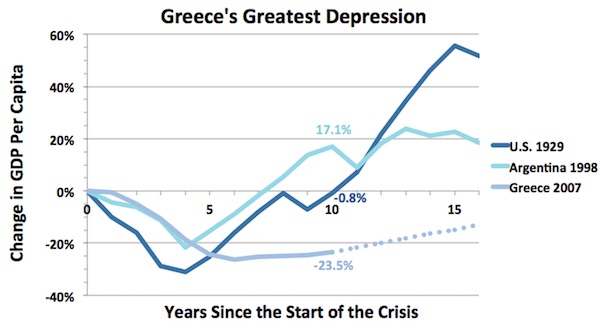
The IMF somewhat optimistically thinks that Greece will still be 12.8% poorer than it was in 2007 in 2023, which would put it on pace to get back to its pre-recession peak sometime around 2030 or so. They have made a desert, and called it a recovery.

“..33% of Greeks now work for less than 380 euros a month. Gross, before tax…”
• Greece: Economic Health In Grim State (EN)
In an extended interview in Lisbon, Greece’s former finance minister Yanis Varoufakis has given a very grim assessment of his country’s economic health. It came after European Commission President Jean-Claude Juncker said on Thursday, whilst on a visit to Athens, that Greece will become what he termed a “normal” country by the end of the summer. “Everyday is worse than the previous day. All talk of recovery, and of Greece having turned the corner, is to add insult on the injuries of the Greek people,” Varoufakis said. “We have a constant reduction in pensions, in wages. Do you know that 33% of Greeks now work for less than 380 euros a month? Gross, before tax.
“Already the government has committed, even legislated, to introduce pension cuts in January 2019, to introduce a further increase in taxation of the poorest families, after January 2019. They have comitted to escalate exponentially the evictions of poor families from their homes, repossessions. So, of course there will be no changes after the summer of 2018.” In 2016 Varoufakis formed the DiEM25, a pan-European left-wing party which is now asssembling a list of candidates for next’s year’s EU parliamentary elections.

The only thing that counts is the energy that isn’t used.
• Solar And Wind Really Do Increase Electricity Prices (F.)
In my last column I discussed an apparent paradox: why, if solar panels and wind turbines are so cheap, do they appear to be making electricity so expensive? One big reason seems to be their inherently unreliable nature, which requires expensive additions to the electrical grid in the form of natural gas plants, hydro-electric dams, batteries, or some other form of stand-by power. Several readers kindly pointed out that I had failed to mention a huge cost of adding renewables: new transmission lines. Transmission is much more expensive for solar and wind than other plants. This is true around the world — for physical reasons. Think of it this way. It would take 18 of California’s Ivanpah solar farms to produce the same amount of electricity that comes from our Diablo Canyon nuclear plant.
And where just one set of transmission lines are required to bring power from Diablo Canyon, 18 separate transmission lineswould be required to bring power from solar farms like Ivanpha. Moreover, these transmission lines are in most cases longer. That’s because our solar farms are far away in the desert, where it is sunny and land is cheap. By contrast, Diablo Canyon and San Onofre nuclear plants are on the coast right near where most Californians live. (The same is true for wind.) New transmission lines can make electricity cheaper, but not when they are used only part of the time and duplicate rather than replace current equipment. Other readers pointed to cases that appear to challenge the claim that increased solar and wind deployments increase electricity prices.
[..] What is most remarkable about U.S. states heavy in solar and wind is that electricity prices rose so much given the huge decline in natural gas prices. Had natural gas prices not plummeted at what was almost the exact same time as the beginning of the large-scale build-out of solar and wind in the United States, price increases in solar and wind heavy states would have been far larger. Around the world, from Germany and Denmark to Spain and South Australia, even modest penetrations of solar and wind, compared to what advocates claim we will need to decarbonize, lead to large price increases.

It’s a step alright. But it’s far from total.
• EU Member States To Vote On Near-Total Neonicotinoids Ban (BBC)
Member states will vote on Friday on an almost complete ban on the use of neonicotinoid insecticides across the EU. Scientific studies have linked their use to the decline of honeybees, wild bees and other pollinators. The move would represent a major extension of existing restrictions, in place since 2013. Manufacturers and some farming groups are opposed, saying the science remains uncertain. Neonicotinoids are the most widely used class of insecticides in the world, but concerns about their impact on bees have been reinforced by multiple research efforts, including so-called “real world” trial results published last year. Back in 2013 the European Union opted for a partial ban on the use of the three chemicals in this class: Imidacloprid, clothianidin and thiamethoxam.
The restrictions applied to crops including maize, wheat, barley, oats and oil seed rape. The new Commission proposal would go much further, meaning that almost all outdoor uses of the chemicals would be banned. The action has been driven by a recent report from the European Food Safety Authority (Efsa), which found that neonicotinoids posed a threat to many species of bees, no matter where or how they are used in the outdoor environment. Another key element that has pushed the Commission to hold a vote has been the UK’s change of heart on the use of these insecticides. Environment Secretary Michael Gove announced last November that the UK would now support further restrictions. “I think it has helped the dynamic,” Franziska Achterberg from Greenpeace told BBC News.
“It has helped sway Ireland definitely, and then lately, the Germans, the Austrians and the Dutch. I think the fact the UK had come around was a good signal for them as well, that they could not stay behind.” During the partial ban, some countries including the UK were given permission to use neonicotinoids for short periods. However, the EU Commission is now signalling that it is seemingly intent on pushing the proposal through as it stands. “Several countries have said they want exemptions on sugar beet for example,” said Sandra Bell from Friends of the Earth (FOE). “So far the Commission have been very strong on this, because they say the Efsa evidence backs the extension of the ban to sugar beet and therefore they are following the science and won’t put in an exemption for a compromise.”
Growers will be free to use neonicotinoids in greenhouses across the EU, despite some environmental groups having reservations about the chemicals leaching into water supplies. Other neonicotinoids including thiacloprid and sulfoxaflor will continue to be exempt from the ban.









Home › Forums › Debt Rattle April 27 2018